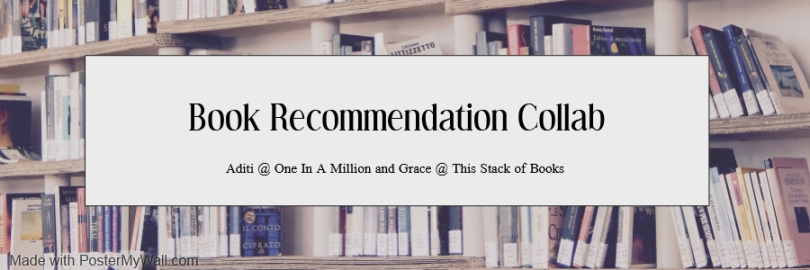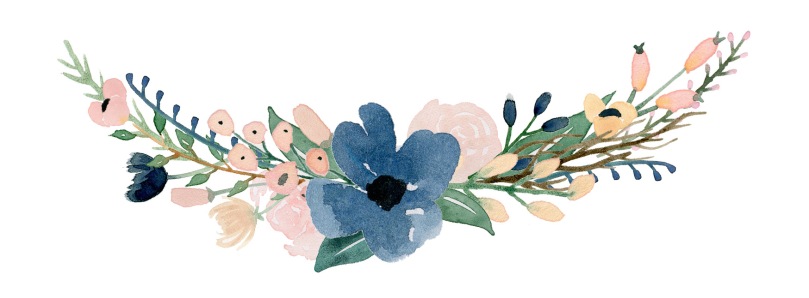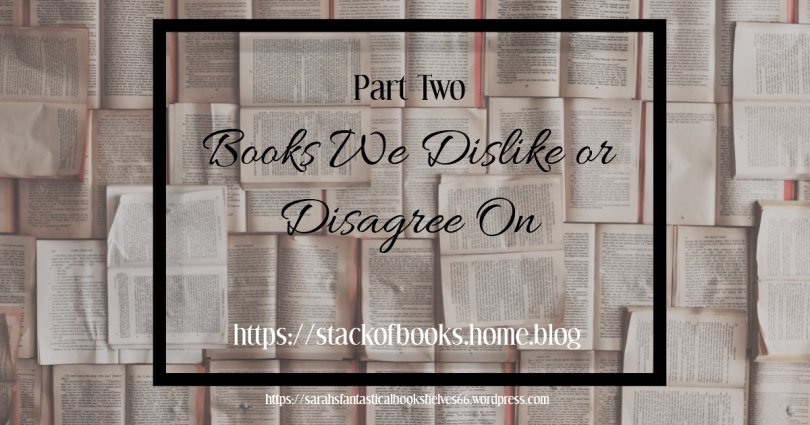Aditi from One In A Million recently reached out and asked be interested in doing a bookish collab sometime. I said yes, and we decided to ask each other just a few questions to learn a bit about each other’s reading tastes, and then recommended the best books we could think of for the other person.
Aditi’s a smart, sweet, and well-read blogger. It was so much fun to get to know her better and recommend to her, and she did an amazing job with her recommendations. I’m excited to read the books she suggested! To see what I recommended for her, be sure to visit her wonderful blog.
This post includes the questions I answered to give Aditi some information about what I like to read, the books she recommended, and my reactions to her recommendations. In a few weeks, we’ll follow up with reviews of a few of the recommended books, so keep checking back. Enjoy the post!
Questions
What is your favorite book and why?
One of my very favorite books is You Bring the Distant Near by Mitali Perkins. Her characters and her world just come alive and are even more delightful every time I reread it. I love character-driven books, books that follow the lives of the characters and are drive by a character’s everyday struggles and victories. Mitali Perkins does an excellent job showing readers her characters’ hopes, dreams, failures, and flaws; their greatest joys and their greatest struggles. I also love the family dynamics in this book. It’s rare to find a YA book with a family that is intact and loves each other through the ups and downs, and I love that this books shows family as important and impactful.
I also love Salt to the Sea by Ruta Sepetys. I really love historical fiction. It’s amazing to read about what it was like to live a few hundred years ago and walk in the shoes of someone who lived long ago (fictional though that character might be) for a few hundred pages. And again, many historical fiction books are character-driven and have powerful, touching stories and emphasis on the setting.
What is your favorite genre and why?
This is a difficult question because I’m not sure I can narrow down a favorite genre. I read from almost every genre. I read science fiction, urban fantasy, epic fantasy, historical fiction, general fiction, realistic fiction, non fiction… I don’t really care about the genre. I care more about if the book interests me. Did the author present the topic in a novel, interesting way that captures my attention? Do the characters seem alive? Does the world feel like something I can actually touch and feel and smell? This matters to me much more than the genre of the book. I will say that the genres I read the most are probably historical fiction and nonfiction.
Who is your favorite author and why?
Mitali Perkins, Ruta Sepetys, Kristy Cambron, Julie Yip-Williams, William Shakespeare, Ally Carter, Alexandre Dumas, Jason Reynolds… these are all authors I really enjoy. I don’t think I can pick one favorite author because there are some authors that write one book I like a lot and then another I don’t care for. I like authors that have a real connection to their characters and show that through their writing, that have an eloquent and almost poetic writing style, that understand how to show their story without telling it, and pace their stories well. There are so many different types of authors I like, but if an author meets that criteria they’re likely to go on my “Favorite Authors” list.
What is your favorite book series?
I like The Wingfeather Saga by Andrew Peterson very much. It’s a fantasy series with amazing characters, an intact and loving family, plenty of adventures, and a masterfully crafted world. Not once during the series did I get bored, and even though the world was completely fantastical, it felt like somewhere I recognized.
What type of book or book content do you avoid?
I generally avoid thrillers and horror fiction just because I don’t like them. I avoid romance fiction that is just romance fiction, but I can tolerate romantic suspense or historical romance.I prefer to avoid books with excessive language or sexual content. I also avoid books with witchcraft or magic as central theme, especially if the witchcraft or magic is treated as good or normal. However, I’m not opposed to magic in a book as a whole. Fantasy and fictional worlds with magical elements do not disturb me.
What are your favorite and least favorite tropes?
I love books with an unexpected or reluctant hero. I love journey or quest stories. I like letter formats. I like books where somebody goes undercover or uses a disguise. I love travel and road trip stories. I dislike parents who are conveniently gone, that notorious love triangle, main characters that are female but seem to think it’s wrong to do anything that might be considered “girly,” and overly dramatic friendships. I also mainly read books with female protagonists or strong female side, mostly because I can relate more to female characters in general.
Recommendations
The Complete Poems of Emily Dickinson
Because Grace enjoys William Shakespeare and Alexandre Dumas, I recommend to Grace The Complete Poems of Emily Dickinson by Thomas H. Johnson or any of her poems, namely “Hope is the Thing with Feathers”.
I’ve read a few of Emily Dickinson’s poems and loved them! I’ll have to get that book.
Simon v. the Homo Sapiens Agenda
Simon and the Homosapiens Agenda is a very popular book, so Grace might have already read it, but if she hasn’t read that or any of Becky Albertalli’s other books, I recommend them because she prefers books that aren’t just focused on romance and have sweet families.
I’ve heard of Becky Albertalli but haven’t read her yet. I will definitely look up her books! The family dynamics aspect definitely interests me.
Fablehaven, The Unwanteds, and The Land of Stories
Since Grace liked The Wingfeather Saga, she might also like the Fablehaven series by Brandon Mull, The Unwanteds by Lisa McMann, one of my favorite series, or The Land of Stories by Chris Colfer because they are all fantasy. These books all (coincidentally) have sibling pairs who work together, but also have parents that are conveniently absent. Despite this, she could enjoy these series if she hasn’t already read them.
Fablehaven has been on my to-read for a while now! This is the perfect time to finally get them from the library. I’ve also heard really good things about The Land of Stories, so that’s a good recommendation too!
Any book by Sharon Creech
Grace mentioned that she enjoys family dynamics and one of my favorite authors, Sharon Creech, writes beautiful short realistic fiction novels with understandable tween and teen characters that navigate family relationships and friendships changing. I think she might really enjoy Sharon Creech’s books although her writing style might be a bit strange for first time readers.
Of course, Grace has read many books, so she might have already read some of these books. If not, I recommend she starts with Walk Two Moons, being the most popular, followed by either Absolutely Normal Chaos, written in a diary style, or my personal favorite, Chasing Redbird, about a large family and a girl who takes a personal goal and persists despite her family not being the most attentive to her. I love how the family slowly, gradually changes throughout the book and Zinnia, the main character, realizes that her family is actually pretty great. Bloomability is also an amazing book that has lovable characters and an awe-striking setting.
I’ve also heard good things about Sharon Creech! My family read Ruby Holler by her as a read-aloud, and we liked it. Absolutely Normal Chaos sounds like a great book. The title alone would make me want to read it! And side note, but I just looked her up and Sharon Creech has the best covers. They’re all really beautiful!
Number the Stars
Number the Stars, by Lois Lowry, is also a historical fiction that shows a powerful friendship between two girls of different religions living in Nazi Denmark. It’s sweet and might appeal to Grace because she likes the historical fiction genre.
The Giver by Lois Lowry is one of my favorite series! I will definitely look up Number the Stars. I might have read it a while ago, but I love historical fiction, so I’ll have to reread if I have!
Any book by Lois Lowry
Anything by Pam Muñoz Ryan is really good and she writes a wide variety of novels including historical fiction and books about struggling to adjust in a multicultural family like You Bring The Distance Near. I particularly enjoy Echo, a historical fiction borderline-fantasy novel about the threads of fate weaving together three amazing people who’re in three different times in history. And a harmonica. It’s a seriously beautiful story which I think Grace will enjoy. Esperanza Rising, The Dreamer, and Becoming Naomi Leon are also really awesome stories.
I love Esperanza Rising but didn’t know Pam Ryan had more books! This is great! I will order some more of her stuff from the library.
Hope you enjoyed reading Aditi’s recommendations as much as I did! Hop on over to her blog to see what I recommended for her, and let us know if you’d like a few book recommendations for yourself!
What did you think of Aditi’s recommendations? What would you recommend for me? Would you like a few recommendations for yourself? We’d love to hear from you!













